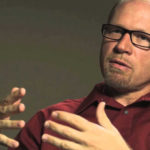We run our website the way we wished the whole internet worked: we provide high quality original content with no ads. We are funded solely by your direct support. Please consider supporting this project.
Dealing With Objections to Open Theism, Part I
There are four major objections to Open Theism. Today we will deal with the first two and then tomorrow the third and fourth. For a basic introduction to Open Theism, click here.
Objection #1: The open view denies omniscience.
It is often argued that the open view denies the omniscience of God, even saying things like, “Open Theists say that God does not know the future.” This is a misunderstanding. Open Theists unequivocally affirm that God is omniscient—that is, God perfectly knows everything there is to know! The disagreement is not about the scope or perfection of God’s knowledge but rather about the content of reality that God perfectly knows. Open Theists simply believe that possibilities are real and that God knows them as such.
Some critics of the open view object that an omniscient God must know the truth value of all future-tense propositions, including propositions about what future free agents will choose. In response, some Open Theists argue that future tensed propositions about what free agents will choose to do have no definite truth value until agents resolve their decisions one way or another. Other Open Theists, however, grant that God must know the truth value of all future-tensed propositions but go on to point out that future-tensed propositions regarding what free agents may or may not do also have truth values that an omniscient God must know.
Objection #2: The open view undermines confidence in God’s sovereignty.
If God doesn’t foreknow all that shall come to pass, some argue, the future is largely left to chance; people’s suffering may be meaningless and God’s can’t assure us he can bring good out of evil or triumph over evil in the end. How can you trust a God who faces a partly open future?
Not everything happens “for a divine purpose” in the open view. Far from being an objection to this view, however, Open Theists see this as one advantage of their view. If a person believes every specific thing happens for a specific divine reason, they must accept that every horror in world history—from the raping of children to the gas chambers of Auschwitz to specific individuals going to hell—takes place “for a divine purpose.”
If God has unlimited intelligence, as Christians have always affirmed, then he can anticipate and plan a response to possible future events as effectively as he can to certain future events. The only reason we humans can more effectively anticipate a certain future event than we can a number of possible future events is because we have a limited amount of intelligence. The more possibilities we have to anticipate, therefore, the thinner we have to spread out limited intelligence to anticipate each possibility. So of course we’re less effective at anticipating possibilities than we are certainties.
Open Theists submit, however, that any view that thinks God is more in control of the future merely because he knows it entirely as a certainty rather than partly as a domain of possibilities is bringing God down to a human level by limiting his intelligence. A God of unlimited intelligence doesn’t have to spread thin his intelligence to cover possibilities the way we do. He can anticipate each and every possibility as though each one were an absolute certainty.
Whatever comes to pass, Open Theists can affirm that God was preparing a perfect response to this very event from the foundation of the world. It’s just that Open Theists are so confident of God’s infinite wisdom that they deny that God had to be certain the event was going to take place for this to be true.
—Adapted from Across the Spectrum, pages 65-67
Category: General
Tags: Across The Spectrum, God's Sovereignty, Objections to Open Theism, Omniscience, Open Theism
Topics: Open Theism
Related Reading

8346
Umberto Salvagnin via Compfight Oh oh. It’s getting ugly up in here. Frank Viola is suggesting that Greg needs to fix a nice tall glass of shut-up juice. He and Greg have decided to have a debate on the open view sometime this fall, and they have been engaging in some smack talk since that decision…

Podcast: Does the Cruciform Hermeneutic Sabotage Open Theism?
Greg plays Peek-a-Boo with God and considers whether those verses Open Theists use to support Open Theism might simply be times when God is accommodating for us. http://traffic.libsyn.com/askgregboyd/Episode_0236.mp3

What is the significance of Jeremiah 26:2–3?
The Lord tells Jeremiah to prophesy to Israel that they should repent, for “I may change my mind about the disaster that I intend to bring on [Israel] because of their evil doings.” It is difficult to discern what God intended to reveal about himself by claiming he is willing to change his mind if…

Is exhaustively settled foreknowledge essential to God’s identity
In this episode Greg discusses several passages in Isaiah that imply God’s foreknowledge is a primary differentiator between Isaiah’s God and all other gods. Links: Greg’s book: “God of the Possible“ http://traffic.libsyn.com/askgregboyd/Episode_0023.mp3

What is the significance of Deuteronomy 30:19?
After establishing the terms of the covenant he was entering into with Israel, the Lord says, “I call heaven and earth to witness against you today that I have set before you life and death, blessings and curses. Choose life so that you and your descendants may live.” This passage represents the most fundamental motif…

Why Can’t God Stop Evil? The Thomas J. Oord Interview (podcast)
Greg and Thomas talk about Open Theism and how Greg’s views differ from Thomas’s. Theology nerds, get your compass and your flashlight and prepare to go DEEEEEP in the weeds! Thomas’s book: God Can’t Episode 487 http://traffic.libsyn.com/askgregboyd/Episode_0487.mp3

